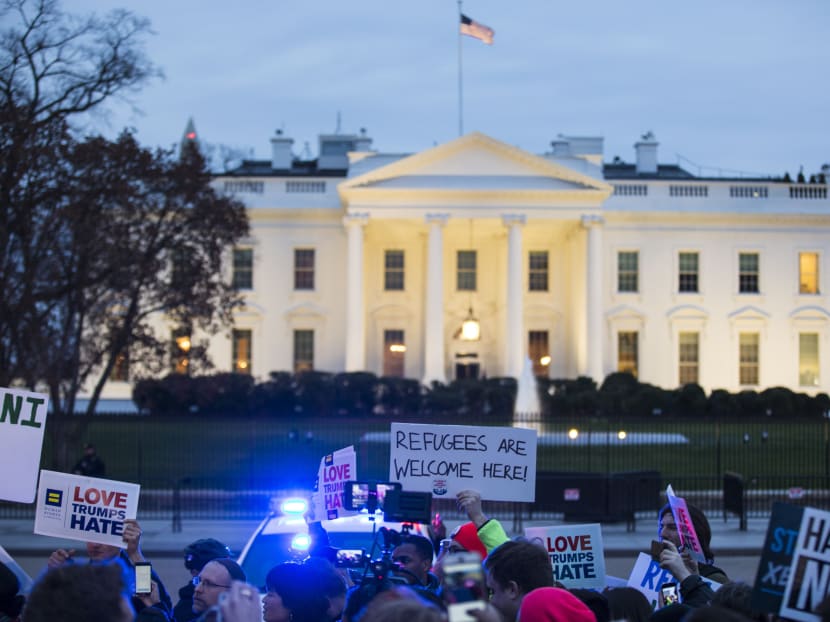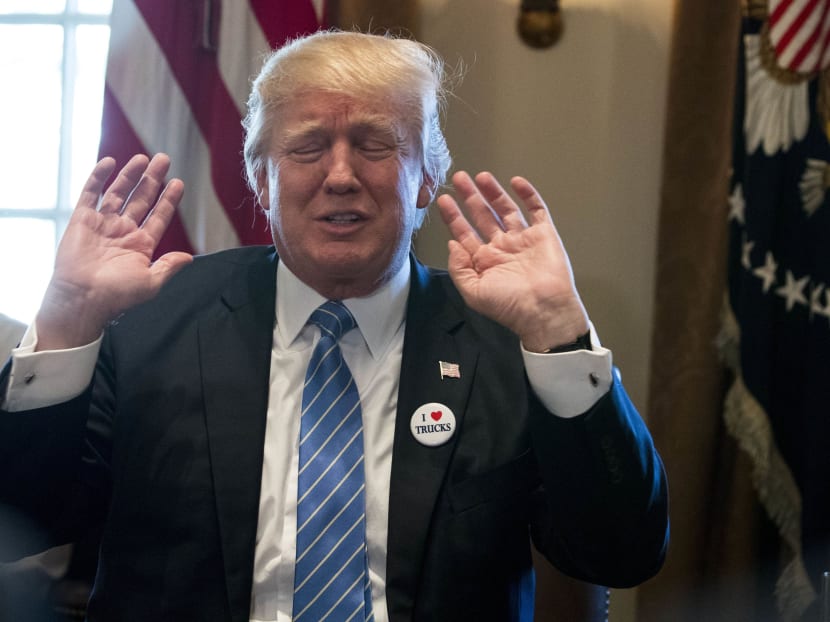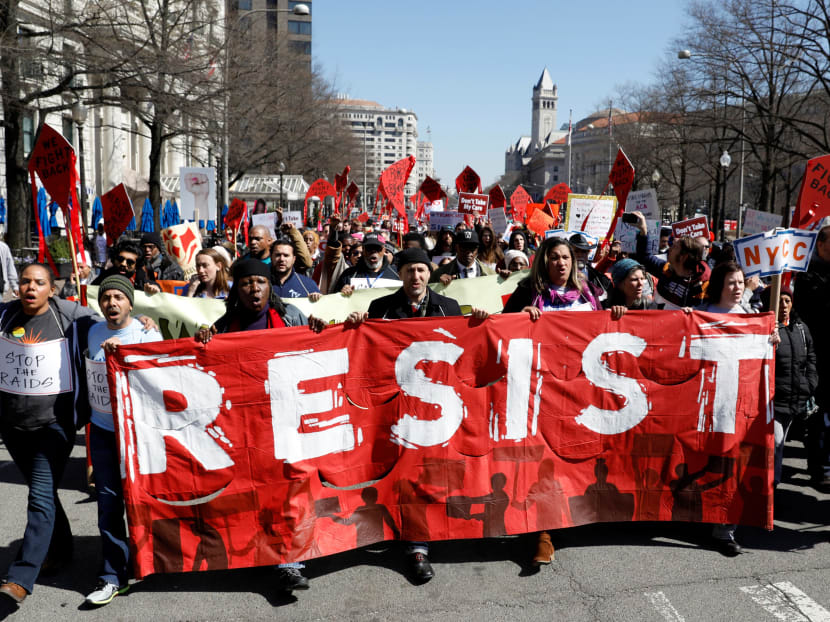Hard reality at home sets in for Trump, with more obstacles to come
WASHINGTON — From resounding setbacks in Congress to stunning policy flip-flops both domestically and internationally, United States President Donald Trump has faced a steep learning curve in his opening months at the White House.



WASHINGTON — From resounding setbacks in Congress to stunning policy flip-flops both domestically and internationally, United States President Donald Trump has faced a steep learning curve in his opening months at the White House.
As he marks the milestone of his 100th day in power on April 29, a cold, hard reality is setting in on the home front for the businessman-turned-politician, who promised Americans he would “win, win, win” for them.
The 70-year-old, whose election victory unleashed a political shockwave around the world, is still clinging to the take-no-prisoners, unpredictable, impulsive style that made him a property mogul and reality TV star. But difficulties at home have made the one-time anti-establishment candidate, who promised to “drain the swamp” in Washington, recognise – with a mixture of naivete and craftiness – that he has one of the most difficult jobs in the world.
While Mr Trump may have promised sweeping-change-made-easy as President, he has found himself facing fierce opposition to his domestic policies in Congress and the courts.
It is a basic civics lesson most school kids know by heart, but one that Mr Trump has had to re-learn the hard way: Under the US Constitution, the power of the President is checked by the legislative and judicial branches.
Those checks and balances have resulted in major setbacks for the first-time politician’s two biggest domestic initiatives to date: His travel ban and his attempt to overhaul the healthcare system.
Just one week after his inauguration, Mr Trump issued an executive order banning travellers from seven majority-Muslim countries and all refugees. Unveiled with no prior warning, it sowed travel chaos and confusion, and ignited worldwide outrage.
However, in a humiliating blow for the President, a court in Washington state blocked the order on the grounds that it violated the Constitution’s prohibition of religious discrimination.
After the block was upheld on appeal, the administration issued a revised ban it said would adhere better to the law. It would close US borders to nationals of Iran, Libya, Somalia, Sudan, Syria and Yemen for 90 days, and all refugees for at least 120 days. Iraq was on the original ban but removed in the revision.
Still, courts in Maryland and Hawaii dealt the White House a new blow last month, ruling that the second ban also discriminated against Muslims.
These court challenges to Mr Trump are taking place in one of the most polarised contexts in history, with the President lashing out against what he calls a politicised justice system, accusing it of encroaching on presidential powers that he is discovering are far less absolute than he imagined.
Another setback that Mr Trump suffered during his first 100 days as President was the failure to do away with the Affordable Care Act, one of the pledges that he made during the campaign trail.
Mr Trump’s highly promoted effort to replace “Obamacare”, the health-coverage law implemented under his predecessor Barack Obama, has lagged in Congress, where some fellow Republicans are opposed to the new plan.
The healthcare Bill fell victim to bickering between two competing groups in Mr Trump’s party: A band of grassroots conservatives, centred on the House Freedom Caucus, who routinely buck leadership; and establishment-leaning moderates, who are more likely to seek consensus over confrontation.
The Democrats have also been unanimous in their opposition to Mr Trump’s repeal of Obamacare.
On Wednesday, there was hope that the Bill may be revived before Mr Trump’s 100th day milestone as the House Freedom Caucus endorsed an amended plan to replace the Affordable Care Act. But by Thursday evening, this hope was dashed as Republican leaders still had not collected enough votes from moderate Republicans whose backing was also needed for passage in the House.
Mr Trump has also not been able to set in motion his much-talked-about plan to build a wall along the US-Mexico border. He campaigned throughout the country last year promising a wall across the entire southern border, promising that Mexico would pay for it.
Earlier this week, the Trump administration signalled that it may be willing to wait until a later date to secure federal funding for the border wall. The backing down could make it possible for Congress to finish work on spending legislation in time to avoid a government shutdown this weekend.
Mr Trump told a group of conservative journalists gathered at the White House on Monday that he could put off until September – the last month of the fiscal year – in asking Congress to include the money for the border wall in the federal Budget.
That could remove, at least for now, one of the biggest deal-breakers he has inserted into talks to pass a Bill this week that would finance the government until September.
Democrats, whose votes will be needed to help pass the spending plan, hope he will blink to avoid an embarrassing shutdown for a new President trying to prove he can govern.
OBSTRUCTION BY THE DEMOCRATS
White House aides said that Mr Trump will have signed 30 executive orders during his first 100 days, the most of any President in their first 100 days since World War II. But implementing them is another matter together, and this has put him in a poor light compared with Mr Obama and Mr George W. Bush, who both had victories on Capitol Hill by their 100th day.
“Executive orders are the easiest, simplest way to showcase action by the President to begin to fulfil some of the pledges made in the campaign,” said Dr Mark Rozell, Dean of George Mason University’s Schar School of Policy and Government.
“This President has found that legislating is hard work.”
White House Chief Strategist Steve Bannon likened legislation to the massive Allied invasion of German-occupied France during World War II.
“Moving a big piece of legislation is the equivalent of landing on Normandy. You have to have the amphibious ships, the cruisers, the battleships, the planes, the troops,” Mr Bannon, who is a former naval officer, told the Financial Times.
“You have to get to the beach and you have to push up and all the logistics have to be there. Everything has to come together on the hour and the minute for D-Day.”
Mr Trump’s task of running America has not been helped by tensions among the Republicans with the healthcare Bill episode being most illustrative of the civil war brewing within the GOP.
“We were a 10-year opposition party, where being against things was easy to do,” House Speaker Paul Ryan had said after the failed push to repeal Obamacare. “Now, in three months’ time, we tried to go to a governing party where we actually had to get 216 people to agree with each other on how we do things.”
Mr Trump himself attacked members of his own party when he declared, following the failed healthcare push, that the Freedom Caucus would hurt the Republican cause. He also vowed to “fight them” during the 2018 mid-term elections if they did not support him.
Matters are not helped by the fact that Mr Trump has always been seen as an outsider by the Republican establishment, and this is still the case with him in the White House.
“The perception of Trump being an outsider has perhaps been reinforced because he selected a team of insiders and loyalists to serve in his Cabinet,” Dr Andrew Delios of the Department of Strategy & Policy at the National University of Singapore’s Business School.
Dr Hans Hassell, an assistant professor of politics at Cornell College, said that the fact that Mr Trump has not been able to win legislative victories may say more about divisions within the Republican Party -- between mainstream Republicans and the House Freedom Caucus -- than it does about the President himself.
“You would expect a Republican with Republican majorities in both the House and Senate to be able to get through some substantial legislation,” Dr Hassell told Iowa Public Radio.
He added that the schism within the GOP would cause problems for any Republican President, not just Mr Trump, because there would be the “same structural problems that would make it difficult to pass legislation within his own party”.
Going forward, the Trump administration is likely to face more obstacles at home, especially from the opposition Democrats, analysts say.
“Some Democrats will work with Trump on infrastructure, particularly if it brings jobs to their states or Congressional districts,” Mr Dougal Robinson, an expert on US politics, told TODAY.
“But on most issues, Congressional Democrats are unlikely to work with Trump, as the Democratic base demands ‘resistance’ to Trump’s agenda. Democrats need their base to be angry with the President and turn out en masse in 2018 if they are to have any hope of reclaiming either the Senate or the House, and thereby regain some formal power in Washington,” added Mr Robinson, who is a research fellow at the United States Studies Centre at the University of Sydney.
“We should expect Democratic obstructionism until the 2018 mid-term elections.”
AGENCIES WITH ADDITIONAL REPORTING BY ALBERT WAI






